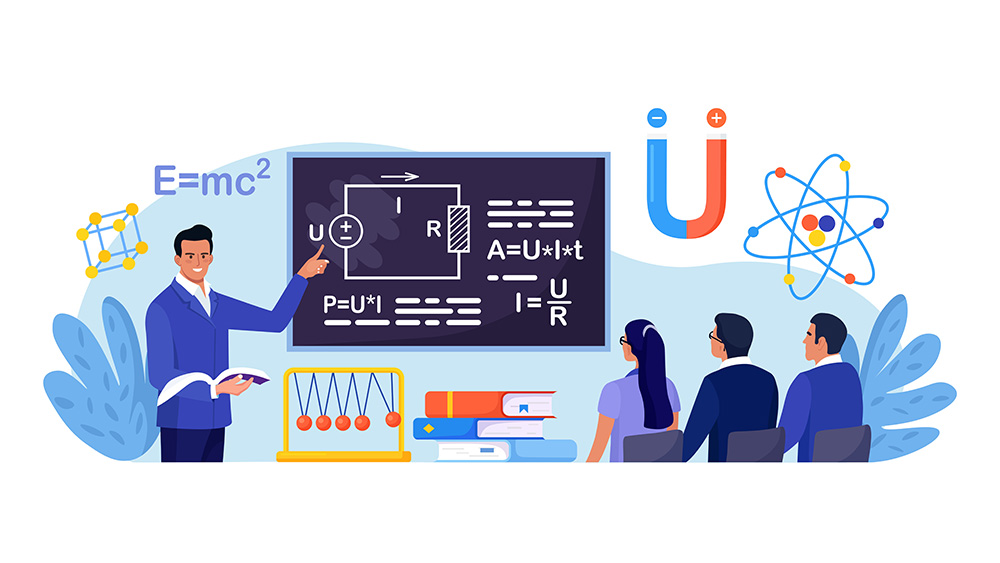




 03/21/2024
03/21/2024
The International Baccalaureate (IB) Diploma Programme (DP) Physics provides students with a challenging curriculum designed to develop a deep understanding of basic physics theories, ideas, and principles.
This course, which is designed for students between the ages of 16 and 19, uses inquiry-based learning strategies to build students' theoretical knowledge and practical abilities.
IB DP Physics includes optional topics such as optics, quantum physics, astrophysics, and relativity in addition to a broad variety of topics encompassing mechanics, waves, electricity, thermal physics, magnetism, and atomic and nuclear physics.
Problem-solving, Critical thinking, and experimental research are the main features that set IB DP Physics apart. Students build their investigative abilities and enhance their comprehension of the scientific process through practical laboratory work, analysis of data, and scientific inquiry.
Students can also investigate the connections between physics principles and other scientific fields as well as practical applications, as the course promotes interdisciplinary connections.
Students enrolled in IB physics tutor are better prepared for postsecondary education in physics-related subjects and are encouraged to recognize the significance of physics in solving world problems and forming our conceptual framework.
Important Aspects of The IB DP Physics Coursework
Several essential components of the IB DP Physics programme are designed to give students a thorough understanding of physics concepts and to develop their investigative and analytical abilities.
Offering both standard (SL) and higher (HL) levels, the course guarantees flexibility and complexity of study to meet the interests and objectives of students in the classroom.
Levels: 150 for SL and 240 for HL; available at regular (SL) and higher levels (HL), providing adaptability and richness in study hours.
Evaluation: Students are evaluated both internally and externally, using an internal assessment (IA) programme and a shared core syllabus for both SL and HL.
Depth of Study: As a result of a more comprehensive and in-depth curriculum, HL students study more subjects, engage with more difficult extension materials, and go deeper into certain themes.
The practical approach prioritises experiential learning through a combination of short- and long-term projects, such as the multidisciplinary group 4 project.
Twenty percent of the assessment is internal, and it is the result of a single, independent study. This is evaluated by teachers internally and externally by the IB. It may entail practical experimentation, data analysis, modelling, or simulation.
The Standard Level (SL) and Higher Level (HL) of the IB Physics syllabus contain a wide range of topics connected to the study of physics.
The following subjects are included in the syllabus for SL:
The syllabus for HL includes all of the topics covered in the syllabus for SL in addition to the following topics:
Outline of the Standard Level Syllabus for IB Physics
The IB Physics Standard Level syllabus offers a balanced curriculum that prioritizes both theoretical expertise and practical abilities, giving students a thorough understanding of key physics concepts.
An overview of the SL syllabus's elements and suggested teaching hours is provided below:
Fundamental Elements:
Measurements and Uncertainties: Knowing how to measure things and evaluating uncertainties. (Suggested number of instruction hours: 5)
Forces, motion, and energy within mechanical systems are studied in mechanics. (22 hours of instruction are advised.)
Thermal Physics: Studying things related to temperature, heat transmission, and thermodynamics. Eleven recommended hours of instruction
Waves: Analysis of wave characteristics and behaviors (Suggested instructional hours: 15)
Electricity and Magnetism: Circuits, electromagnetic induction, and electric and magnetic fields are studied (recommended teaching hours: 15).
An examination of the relationship between gravitational forces and circular motion. (Optimal instructional duration: 5)
Investigating radioactivity, the structure of atoms, and interaction between particles is the focus of atomic, nuclear energy, and particle physics. (Optimal number of instruction hours: 14)
Energy Production: Knowledge of energy sources, conversions, and uses. (Optimal number of instructional hours: 8)
Outline of the IB Physics Higher Level Syllabus
The curriculum for the IB Physics in Delhi Standard Level (SL) includes a thorough exploration of physics' foundational ideas, thoughtfully designed to give students a firm grasp of the topic. An outline of the syllabus's elements and suggested teaching hours is provided below:
Fundamental Elements:
Measuring and Assessing Uncertainties: This section establishes the foundation for exact scientific investigation by exploring measurement methods and analyzing uncertainties. (5 hours of instruction is recommended)
Mechanics: Investigates motion dynamics, forces, momentum, and energy conservation, offering crucial understandings of how physical systems behave. (22 hours of instruction are recommended.)
Thermal physics: Provides a greater understanding of the transfer of energy and transformation in many systems by examining temperature, heat exchange mechanisms, and thermodynamic concepts. (Optimum number of instruction hours: eleven)
Examines waves and their behaviours, including reflection, refraction, and interference. Wave phenomena are important to comprehend a variety of technical and natural phenomena. (Aim for fifteen hours of instruction.)
Learn about electromagnetic induction, circuits, electric and magnetic fields, and the basic forces that control magnetic electrical interactions in Electricity and Magnetism. (Aim for fifteen hours of instruction.)
Mechanics associated with cosmology and planetary motion are clarified by investigating the dynamics of circular motion and gravitational forces. (5 hours of instruction is recommended)
Atomic framework, radioactivity, and the behaviour of subatomic particles are all investigated in quantum physics, which reveals the basic components of matter and the forces that control their interactions. (Education hours recommended: 14)
Energy production is the study of energy sources, conversions, and uses. It also covers the function of energy in a variety of technological and natural processes. (Optimal instructional duration: 8)
You may like these also:
IB DP Physics with IBGA: A Guide from an IB physics tutor
The benefits of hiring an IGCSE physics tutor
Societal value of physics in the view of an IB physics tutor